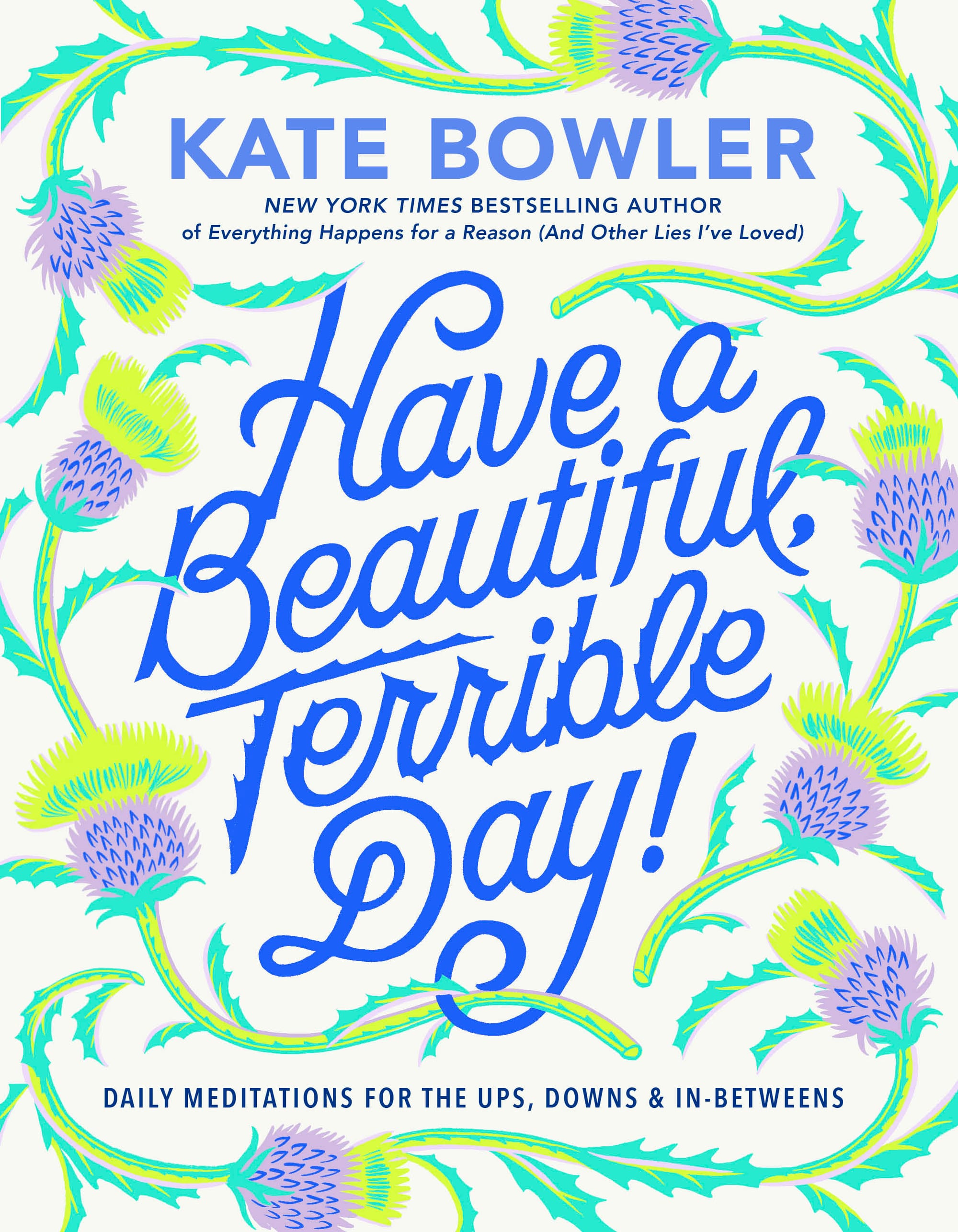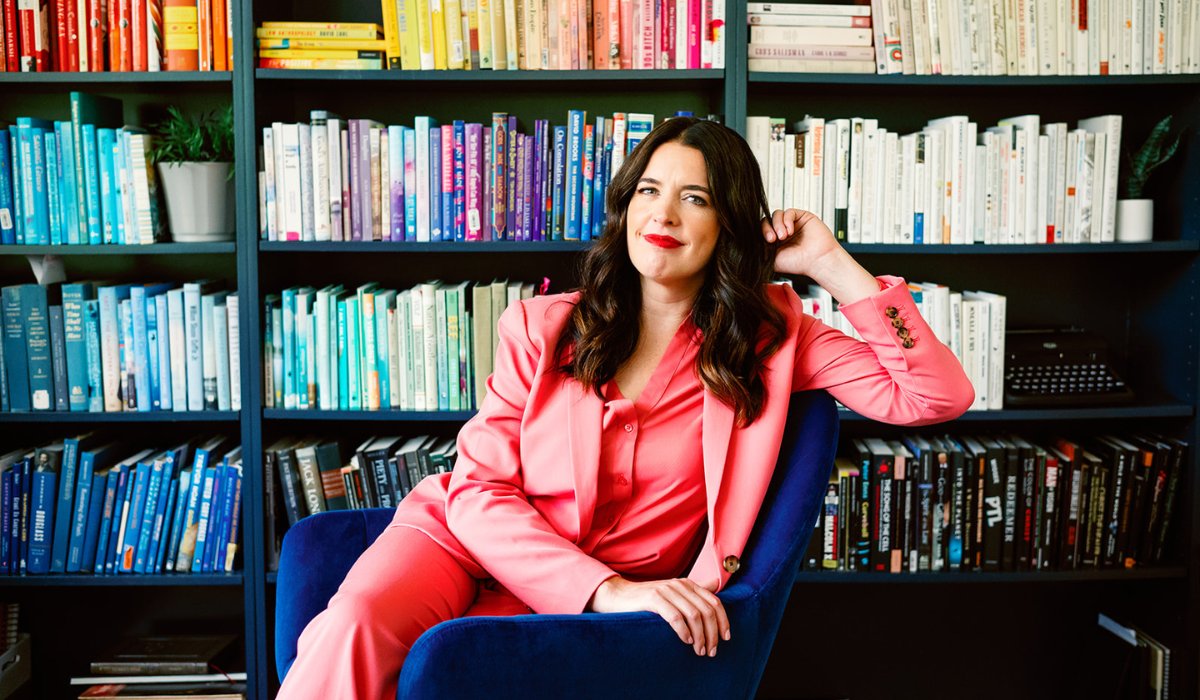Modern-Day Psalmist Kate Bowler Shares 3 Spiritual Reflections on Love All of Us Need This Week
These are terrible days. These are beautiful days. Somehow both realities feel inseparable in our minds now.
We have the sense that something bad might happen, and has already happened. When we read the headlines, we do not shake our heads. We nod. Yes, we think. Of course that would happen.
Our moods seem tight and jittery. We worry about groceries and school shootings and airborne viruses. We worry about kids and parents and friends and whether this, whatever this is, is all we can expect. We worry about the heart-stopping events we have already endured and what will happen next.
We worry about how we will get it all done.
We worry about everything that can never be undone.
But when the sun begins its nightly descent, instinctively, we cast our eyes to the horizon. We have the sense that something lovely will happen, and has already happened yesterday. We notice how the white glare of the sun behind starched clouds is pooling into oranges and deep reds, and our breath begins to slow. We nod. Yes, we think. This is also what happens.
What I want more than anything is to bless you and me right now, and feel the truth of our realities without letting reality itself overwhelm us. People often say, “FAITH NOT FEAR,” as if faithful people can’t be afraid. But we are afraid for so many reasons, many of them both reasonable and realistic. So let’s just settle that controversy now: we can be faithful and afraid at the same time.
My new book, Have a Beautiful, Terrible Day!, contains small reflections and blessings that, I hope, will set the dial correctly on our daily fears and anxieties. Here are three for this week, as we celebrate and think about the love in our lives.
A prayer for love, love, love …
Love, love, love—the simplest word and the most complicated act. Our love sucks us into errands. Our love bends our dreams toward other people’s fulfillment. Our love is often directly at odds with our ability to rest, play, eat, sleep, or even have much time for the people we love. (Can I get an AMEN?)
It’s the strangest phenomenon and one we all understand because we have seen it up close. The more we love … then the more we love. There is no scarcity in love. There is scarcity of time and resources, yes, but love grows and grows. I was trying to explain this to my son, who was exhibiting characteristically zero subtlety in asking who I love more. Do I love the next-door neighbor more? Do I love other children more? If I had more children would they go to the top of the list?
“Oh, hon, it’s the weirdest thing. But when you love people, it’s like they move into your house. But your home mysteriously multiples and makes more rooms to put everybody,” I said, finally.
“Where am I then?” he asked.
“The living room,” I replied.
“Great,” he said definitively. “I guess Dad can have the garage.”
Ahhhh, the generosity of the human heart. But I stand by my argument. Where love is concerned, it’s an Open House.
Lord, the shadowed world
is full of troubles.
So give me the good,
inconvenient work of love.
Link my life to others
so that their worries
become my own.
Give me errands I don’t want
which ease the burdens of others.
Divert me from the plans I’ve made
to zip from A to B
when you have better ideas.
Put my hands to work
with a less-grumbling heart
and let their dreams drift into my own.
You’ve given me tools to use
and ideas to fashion
that will bring me neither recognition,
nor money, nor praise.
You’ve made love such a sneaky thing.
The more we love as you do,
the less we are keeping track of it at all.
A prayer for breakup, divorce, or heartbreak …
Heartbreak is a kind of grief. It is a terrible ending. And yet we are lacking the permission to say that it feels like a death without a funeral. Everyone goes on living and, oh, look, you can find them on social media. Wait, is it just me or do they seem happier?
It’s complicated. And lonely. And shockingly ongoing because our online and in-person relationships continue to provide evidence that they go on thriving without us. We might worry in moments of brokenness that there isn’t spiritual language for how bad it feels. (We think, Oh, surely people of faith shouldn’t be mired in heartbreak or divorce or relationship sadness … ) Let’s shake off that reluctance and remember that our suffering is a time when God is especially good at being known.
We need God to meet us here in this strange, embarrassing, and awful place. We need God, as the psalmist says, to bind up our wounds. To heal and strengthen us and walk with us as we begin this reinvention. We need God to make something out of the bits and pieces of what is left and surprise us by something, anything, everything new again.
We made plans, Lord.
We strung our hopes together
like glass beads on a cord.
I poured myself into the shape
of that love, Lord,
and it changed me.
Without them, I might have been …
who knows?
Someone more.
Someone less.
Friends (bless them) will say:
“GOOD FOR YOU. You are better off.”
And I will nod,
except at the bit I can’t admit:
I miss the terrible familiarity of who I was.
Who we were.
Who we imagined ourselves to be.
When I step back, I can see how,
in this relationship,
some of my best qualities
grew bright and strong.
I could be courageous and kind,
forgiving and openhearted.
But standing before you, Lord,
I can see how my body curls around
the wounds they left behind:
bitterness and embarrassment,
worry streaked with despair.
I miss them.
I ache to feel the familiarity of their love.
I am tripping over every mention
of the future alone.
Today feels like a funeral without a body.
Walk me through the motions, God—
grief and fear and love—
until I can leave the worst behind.
Love me into a wholeness
I couldn’t possibly imagine
here, now,
in the shadow of their love.
For married love …
One of the funniest things about meeting people who have been married for a long time is how quickly they will tell you about it.
Me: Oh, nice to meet you! What’s your name?
Them: I HAVE BEEN WITH LINDA FOR FORTY-FIVE YEARS!
Me: What did you say you do for work?
Them: FORTY-FIVE YEARS!
Marriage is one of the most difficult and most rewarding commitments that we make. We make promises to someone long before we know if we have the ability or willingness to follow through. We get up in front of witnesses and declare that love conquers all even when, at some point, we may feel entirely conquered by other circumstances instead. It’s as if we peer into the future and, instead of seeing nothing much at all, decide that we see ourselves there, older, changed, and loved. That takes such courage, such hope.
However we have experienced marriage—as a refuge (or not), a partnership (or not)—I wonder if we could bless it. Unconditional love is rare. When we see it in ourselves or anyone else, let’s draw close to it like we are warming ourselves by a fire. We are learning something about God’s long covenants of love.
Lord, thank you for the love that endures.
Love that rings on
long after the note is struck.
Love that holds together two
who solemnly swear
to be faithful to one another
without even a reasonable foreshadowing
of what the world will bring
to their doorstep.
Begun in hope,
witnessed and celebrated in community,
and blessed by God.
We promise and you promise.
That’s why it’s sacred.
We hold on to what holds us.
Of all endeavors it is the
most awe-inspiring
and the hardest to fulfill.
For it’s only after the wedding
that the marriage can begin.
After the promises are made
and the vows sealed
then—poof—a wife or a husband appears.
(Who is that?!)
And the best and worst in each.
Blessed are we who become
witnesses to the truth
that every person is a foreign country,
even to themselves.
Marriage must therefore be an unveiling
at the borderline where desires meet,
in confluence or in conflict,
and sharp corners chafe
and are rubbed smooth,
proof that the whole is greater
than the sum of the parts.
Blessed are we in celebration
of married love,
where in one word or a glance,
an old joke can be fully reconstituted,
no footnotes required.
You know it’s a miracle when we set aside our predictable self-sabotage
for a love that brings us back to each other.
Excerpted from Have a Beautiful, Terrible Day!: Daily Meditations for the Ups, Downs & In-Betweens! by Kate Bowler. Copyright © 2024 by Kate Bowler. All rights reserved. No part of this excerpt may be reproduced or reprinted without permission in writing from the publisher.

Kate Bowler, PhD is a three-time New York Times bestselling author, award-winning podcast host, and an Associate Professor of American Religious History at Duke University. After being unexpectedly diagnosed with Stage IV cancer at age 35, she penned the New York Times bestselling memoir, “Everything Happens for a Reason (and Other Lies I’ve Loved)” and “No Cure For Being Human (and Other Truths I Need to Hear).”




